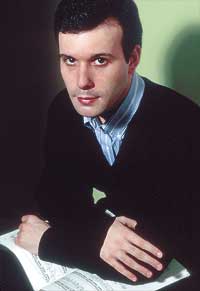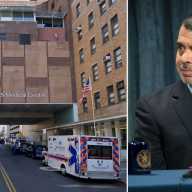Although not yet 30 years old, Michael
Hersch has been showered with more superlatives, honors and commissions
than composers twice his age even dream about.
He was recently the subject of a glowing
profile in the New York Times, was recipient of a Guggenheim
Fellowship and will have his latest work, "Umbra,"
premiered by the Brooklyn Philharmonic on April 6.
Strictly speaking, "Umbra" isn’t
the most recent Hersch composition to be commissioned by a prestigious
orchestra, even though his Symphony No. 1 and the orchestral
work "Ashes of Memory" were unveiled by, respectively,
the Dallas Symphony in 1999 and the Pittsburgh Symphony last
year. As Hersch points out, he was approached about "Umbra"
several years ago.
"I met [Brooklyn Philharmonic conductor]
Robert Spano at the Tanglewood Festival in 1997, and it originated
back then," the composer explained from Rome during a telephone
interview with GO Brooklyn. "It takes quite a while for
commissions to fulfill themselves between scheduling and funding.
To commission a work for large orchestra from an unknown composer
is daring, and at the time I had very few performances of anything
I had written, so for that, too, it was quite a risk.
"It preceded everything else that
I’ve been commissioned to write, and for that I owe [Spano] a
debt of gratitude."
Like all of Hersch’s work, "Umbra"
is a bold, brash, muscular piece of music. It’s written for strings,
wind and percussion – basically, your standard symphony orchestra
without the brass instruments.
Hersch describes it this way: "It’s
25 minutes long and it’s in seven movements: six variations of
differing slow tempos, then a last movement that’s kind of explosive
– large, frantic and fast."
Hersch also explains his choice of title.
"I generally don’t like to give names for works beyond Symphony,
Quartet or Trio," he admits. "[This title] means nothing
too specific, but if you look up the definition of ’umbra,’ it
means something that’s shadowy and black, and the piece is relatively
dark throughout."
Although Hersch currently lives in Rome
– he won the prestigious Prix de Rome, a one-year fellowship
to study at the American Academy in Rome – he will cross the
Atlantic to hear Spano and his forces give "Umbra"
its world premiere.
"I’ll definitely be in the audience,"
Hersch says, and he’ll also take part in two pre-concert discussions
about his music in the Hillman Attic Studio at BAM. "I’ve
never had anything of mine performed in Brooklyn before, so I’m
looking forward to that as well."
"Umbra" is not the only Hersch
composition to be heard locally this spring. His 20-minute Octet
for two string quartets will have its world premiere at Merkin
Concert Hall in Manhattan in May, and his haunting "Ashes
of Memory" will have its New York premiere at Alice Tully
Hall on April 25, performed by the Peabody Symphony Orchestra.
(Hersch is a Peabody Conservatory alumnus.)
Controversy erupted last month at Carnegie
Hall when Mariss Janssons and the Pittsburgh Symphony played
only the second of "Ashes of Memory’s" two movements,
even though they had previously premiered the work in its entirety.
"It’s a complicated issue," Hersch
sighs. "Janssons took a critical beating for that, but the
reality is that concert seasons are set up two years in advance.
The Carnegie schedule was already set, and to his credit he did
everything he could to get this on the program. I agree that
the piece should be done in its entirety – it’s not ideal, but
I was flattered by the gesture."
As a 29-year-old classical composer in
a world dominated by pop culture, Hersch admits to extraneous
influences. "Being alive at the time we are, we can’t help
but take in everything around us," he says. But keeping
his ears open doesn’t mean he’ll be writing a song cycle for
Eminem or an opera for N’Sync anytime soon.
"I often find myself going back to
Bach, and among living composers, there’s [German] Hans Werner
Henze and [Hungarian] Gyorgy Ligeti, whose newer music I really
like," says Hersch.
Hersch also returns to his own past for
inspiration. "Being from Virginia, I like to listen to bluegrass,"
he says, and you can almost hear him grin when he continues,
"There’s simply nothing better than hearing a well-played
banjo."
Robert Spano and the Brooklyn Philharmonic
will perform a program of works by Henry Purcell, Luciano Berio,
Richard Wagner, Michael Hersch and Alexander Scriabin on April
6 at 8 pm and April 8 at 3 pm at the BAM Howard Gilman Opera
House [30 Lafayette Ave., (718) 636-4100; Web site: www.brooklynphilharmonic.org].
Tickets are $45, $35 and $20. Senior and student tickets, $10.
Pre-concert discussions with Hersch begin at 7 pm on April 6
and 2 pm on April 8 in BAM’s Hillman Attic Studio.

























